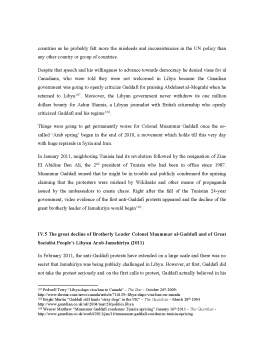Cuprins
- I. Mechanisms
- I.1 General Context
- I.2 Early History – I.2.1 Greek influence
- - I.2.2 Roman influence
- - I.2.3 Arab influence
- - I.2.4 Ottoman influence
- I.3 Libya and the EU–I.3.1Before independence
- - I.3.2The Libyan Monarchy
- II. Trade and the economy
- II.1 Why is Libya important for the EU? – Foreign relations
- II.2 Foreign Direct investment
- II.3Labor
- II.4 How to deal with Libya – Putting an end to illegal immigration
- III. Libya and the EU: How far can relations go?
- III.1What has the EU been doing to support the Libyan people?
- - A decisive humanitarian response
- - A partnership for democracy and shared prosperity
- - A new and ambitious European Neighborhood Policy
- - Dialogue and engagement with the Trans National Council
- III.2 Does Libya really need EU peacekeepers? (Richard Gowan)
- III.3 Why the EU is absent on Libya?
- - Negotiating with Libya
- - Divided we fail
- - End of ESDP (Economic Social Policy Division)
- IV. Relations between Libya and EU in Muammar al-Gaddafi’s era
- IV.1 Rise of Gaddafi’s ruling (1969-1977)
- IV.2Rise of Gaddafi’s notoriety, reforms and the beginning of pariah (1977- 1989)
- IV.3The pariah period and the common enemy (1989 – 2003)
- IV.4Gaddafi as an international positive and appreciated figure and the beginning of the decline (2003-2011)
- IV.5The great decline of Brotherly Leader Colonel Muammar al-Gaddafi and the Great Socialist People’s Libyan Arab Jamahiriya (2011)
- The relations between EU and Libya
- V. Mechanisms
Extras din licență
I.1 General Context
Libya, like so many Third World countries, is still struggling with its past. Its new leaders are constantly emulating its old leaders, its new battles are a continuation of old wars, and its new achievements are the glorification of past achievements . I decided to begin this chapter with the quote of Mansour O. El-Kikhia because it best highlights the close connection between the past and the present of Libya, which in my opinion is an interlinked process. From my point of view, the present-Libya is mirroring the past Libya.
‘Libya (the Great Socialist People’s Libyan Arab Jamahiriya) is a country that is much discussed. Oil economy, North-South trade, international relations and Western solidarity, war against Israel, crisis of the Arab-Muslim, shocks in Maghreb, African issues, all these involve Libya’ .
The name of Libya comes from the Lebou tribe, which crossed the Marmara Sea at the beginning of the 1st millennium BC. In the past, the name was first applied to the region which bordered the West of the Nile valley and Djebel Akhdar, and later it covered the whole continent West of Nile. But in 1911 Italy applied the name of Libya to the whole territory which, in the Ottoman Empire, had the name of Tripolitania. Can we say that Libya nowadays is a recent country, born from the colonial division of Africa? Only in 1934 Libya received a unified administration from the colonial power, and it declared its independence in 1951. But these appearances are nevertheless fallacious. Regarding the various dominations to which it was subjected; Libya has preserved a fundamental, physical and social unity.
‘Geographically speaking, we cannot mistake Libya for Mashreq, or for Maghreb. In terms of human, the homogeneity of this country is based on a Bedouin population which used to practice the agro-pastoral nomadism in solid tribal surroundings. This population was made of sedentary peoples who managed an agricultural life after the Mediterranean model’ . However, the importance of the Saharan sector of this country hindered these sedentary, rural and urban components from taking the exclusive direction of the country.
This permanence of the nomad component figured out the weak advance of the foreign influences in a country endowed with a vast maritime façade and which is crossed by the most important caravans. That is to say the difficulty of the fundamental data in Libya’s life had as an effect the complex problems of history. After so many recent and profound changes, no one could completely remove this originality which is usually misunderstood.
‘From the 5 countries of the Great Maghreb, Libya is the most unfamiliar. This relative deficiency of the documentary resources usually led to the overestimation of the political discourse of its leader. At the beginning of the 21st century, Libya became the country in which the leader’s will was decisive. Behind a direct democracy, the power limitations of the prince and the emergence of a civil society or of an effective political opposition are less perceptible in this country. For a long period of time, this disruption was explained through the economic foundation of the regime: the masters of Tripoli hold the monopoly over the oil resources which are much more important from the political point of view and which after 1950 drew the country out from the agro-pastoral austerity’ .
Preview document
Conținut arhivă zip
- The Relations Between European Union and Libya.doc




























































































